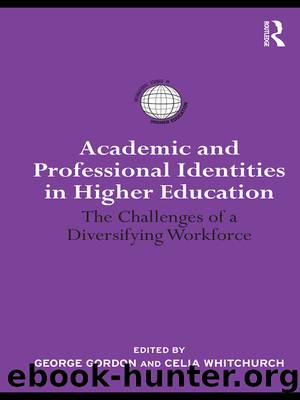Academic and Professional Identities in Higher Education by Whitchurch Celia;Gordon George;

Author:Whitchurch, Celia;Gordon, George;
Language: eng
Format: epub
Tags: Education
Publisher: Taylor & Francis Group
Published: 2009-11-12T00:00:00+00:00
The Formalization of Recruitment Procedures
There would appear to be an overall trend toward more formalized procedures and requirements. In many countries the advertising of a position has hitherto been very succinct, often being limited to a very short description such as âSociology of organization. Skills in quantitative methods requiredâ. Such concise descriptions are less common today, and each recruiting department or institution is expected to provide some detail of the specific programs on which the appointee would be expected to teach, their research interests, and also service activities. In countries such as the United Kingdom (Bessy et al., 2001), where this is common for all types of post, advertisements about academic positions are likely, also, to mention the level of salary.
Parallel with these developments is the growth of candidatesâ portfolios. These tend to be increasingly specific. It has long been the custom to require a curriculum vitae and a list of publications, but many institutions now also ask candidates to provide, for instance, details of the classes they have already taught, and a teaching portfolio. A number of publications may be included in the portfolio, although these may not always be required for the first round of interviews: Musselin (2005) found that in German mathematics departments, publications were required only from the candidates who survived the first round of assessments. The appointment panel would be likely to send them for assessment to external experts rather than reading them themselves. Refereesâ reports are mandatory in many countries, while in France the ârapport de soutenanceâ (i.e. the document written by the members of the panel who attended the defense of a Ph.D. candidate) is always required. This assists the appointment panel to understand the composition of the doctoral panel (who was on it and what their background and reputation are), and the quality of the dissertation or thesis (whether the panelâs report is fair and accurate).
Beyond these changes affecting advertisements and the provision of portfolios, recruitment procedures themselves have tended to become more complex and to last longer. They are no longer informed solely by subjective criteria, as was the case until very recently in France. But even in France, with the implementation of the 2007 Act the rapid interview (lasting twenty to thirty minutes) of the candidates by a single local appointment committee is likely to be replaced by a process that is both more open and prescribed. Some French universities are already considering how appointment processes might be improved, and thinking about introducing more assessment tools. In many other countries the examination of the portfolio is complemented by an extensive assessment of a shortlist of candidates who are invited onto campus. It is no longer unusual to ask candidates to give a lecture and/or a research seminar, then to undertake interviews with different groups of people: the appointments committee, the department chair, the dean, sometimes even the president of the institution. In a Belgian university a psychological test and an interview with a human resources manager have been introduced recently.
This
Download
This site does not store any files on its server. We only index and link to content provided by other sites. Please contact the content providers to delete copyright contents if any and email us, we'll remove relevant links or contents immediately.
Chicken Soup for the Soul Presents Teens Talkin' Faith by Jack Canfield(689)
Understanding PDA Autism in Kids: A Guide for Parents and Teachers to Support Neurodiverse Learners by Jehu Len(558)
The Victorian Era: A Captivating Guide to the Life of Queen Victoria and an Era in the History of the United Kingdom Known for Its Hierarchy-Based Social Order by Captivating History(428)
Brain Teasers to Build Critical Thinking Skills: Brain Exercises for Tech, Banking, Case Interview Prep, and to Keep Your Mind Sharp by Kris Safarova(415)
Brain Teasers to Build Critical Thinking Skills by Safarova Kris(412)
100 Ideas for Secondary Teachers: Engaging Parents by Janet Goodall & Kathryn Weston(391)
Python 101 - Fundamentals by Sam(375)
Critical Curriculum Leadership : A Framework for Progressive Education by Rose M. Ylimaki(365)
Writing Solid Code: Development Philosophies for Writing Bug-Free Programs by Steve Maguire(360)
The Art of Emotional Validation: Improve Your Communication Skills and Transform Your Relationships by Validating Emotions and Feelings by Emily Wright(340)
Intersectionality in Educational Research by Dannielle Joy Davis; James L. Olive; Rachelle J. Brunn-Bevel; Susan R. Jones(336)
The Knights Templar: An Enthralling History of the Rise and Fall of the Most Influential Catholic Military Order by Wellman Billy(330)
A Beginner's Guide to SSD Firmware by Unknown(329)
The Future Knowledge Compendium by Ellyard Peter;(320)
How to be assertive in any situation by Hadfield Sue & Hasson Gill(312)
Foundations of Educational Research by Victoria Elliott(308)
What Every Teacher Should Know about Learning, Memory, and the Brain by Tileston Donna E. Walker;(307)
Making Connections in and Through Arts-Based Educational Research by Hala Mreiwed Mindy R. Carter Sara Hashem Candace H. Blake-Amarante(306)
Message from the Pleiades; The Contact Notes of Eduard Billy Meier v1 only by unknow(302)
